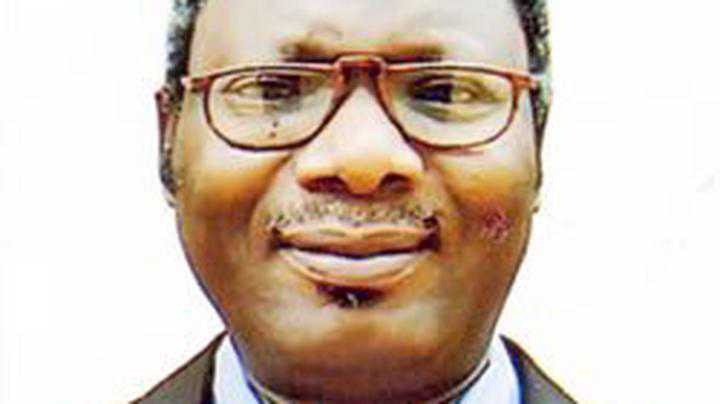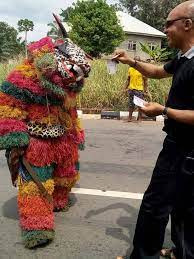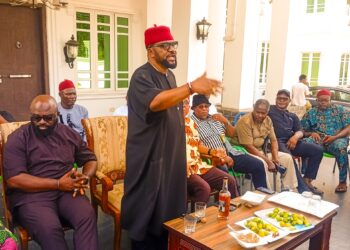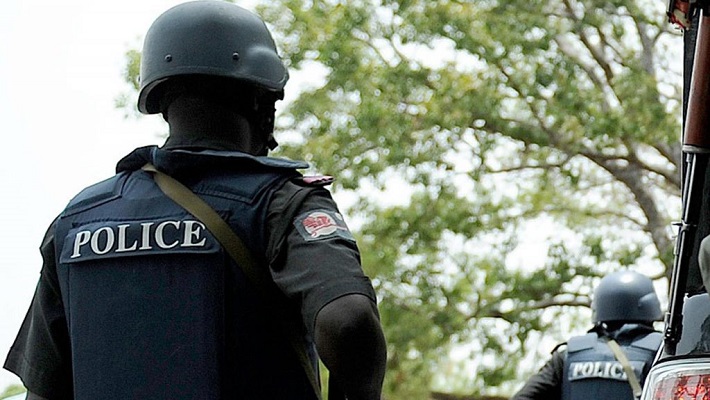Professor Osisioma Basil Chinedu Nwolise is a political scientist, public affairs analyst and a retired
university teacher. He spoke about growing up his life .
CAN YOU SHARE A BRIEF INSIGHT INTO YOUR BACKGROUND?
I was born on 22nd January, 1950 in Abatete, Idemili North Local Government Area of the present Anambra State. I did my primary school, at St. Theressa Primary School, Abatete. From there, I moved to Irua, now in Edo State, very close to Benin and Ekpoma and continued at St. Paul Catholic School. I finished primary school in 1964. But because of the election crises of the period, between the National Council of Nigerian Citizens (NCNC) and Action Group (AG) in the town, my uncle had to relocate to Onitsha because we were living in the house of one Chief Ikhifa, who was then in Action Group, but NCNC was then in control. Chief Shaka Momodu had a petrol station very close to St. Paul Primary School, opposite one Okojie Hospital. Chief Shaka Momodu was in control because he was in NCNC and the NCNC thugs were busy fighting, burning houses, killing people and the opposition party members. Those that were in control came to warn my uncle that they knew Ibos were NCNC, but we were living in the house of an AG member and so, we should pack out. That’s why he relocated from Irua to far away Onitsha. But I didn’t go with him because I told him I must finish my primary school. Though, I was small, I was not joking with my education. I told him even if I would be a slave in someone’s house, I wanted to remain in Irua and finish my primary school.
SO, HOW DID YOU RESOLVE THAT?
He handed me over to one Mr. Stephen Onwuantu. I stayed in his house to finish my primary school and later joined my uncle in Onitsha. From there, I went to meet my father in Abakaliki, Ebonyi State. And my father said I had to repeat primary six so as to be in tune with the education system in the East.
WHAT ABOUT YOUR SECONDARY EDUCATION?
From there, I took entrance examinations. In those days, it was not like now that you have a common entrance into several schools. I took examinations of several secondary schools, DMGS Onitsha; a school in Abakaliki and others. Eventually, I was taken by St. Finbarr’s, Abakaliki. It was a village, developing into a town.
In our days, vehicles went there only on market days . So, we started there. The first outing we had, the first three days, we trekked from school to town as there were no vehicle and we felt home sick! Children who left their parents for almost three months. So, we trekked to town and trekked back to school at the end of the day. But because there was the problem of guinea worm water; it was a mission school, but guinea worm water had to drag some of us out of that school and I relocated to Christ High School, Abor, on the way to Nsukka, from Night Mile Corner, in 1966. I was there when the civil war started in 1967. And so, schools were closed and I had to return to my parents. From Abakaliki, we had to go back to the village in Abatete, a few kilometres off Enugu-Onitsha road.
CAN YOU STILL RELATE THE WAR EXPERIENCE?
During the war everybody from that area Abatete, Nnobi, Nnewi, our boys had to return from whatever battalion or brigade they were, to defend that road. The road going from off Enugu-Onitsha, passing through Nnobi to Nnewi; it’s a road of about seven miles, but the federal troops could not penetrate it for the two and a half years the war lasted. Being General Ojukwu’s village, the federal troops would be happy to grab the town. So, there was a lot of concentration; every young man from that side volunteered to die there, instead of allowing federal troops to cross over to Nnewi. That was how our town was protected throughout the civil war. We did not become displaced persons or refugees because everybody wanted to defend that road; so, we were lucky. If not providence that protected us, by the time the war ended, Biafra was a little circle – a little land area – because the federal troops had surrounded from the sea, they had taken over Port Harcourt, then from there taken over Enugu. So, it was just a little land mass remaining where many of us were choked into. So, after the civil war, I returned to my secondary school. This time, I had to go to Izzi Boys High School and was between Enugu and Abakaliki. It was a terrible period.
First, part of my father’s house was burnt and property looted. So, everybody started from the scratch. Actually, I didn’t want to go back to school because there was no money. I had to raise money from my father, my mother and by farming. Abakaliki was a farming town in those days. I had to buy a big hoe and make yam mounds for people. In Abakaliki, yam mounds could be as high as the roof because they plant yam without sticks. They could plant 10 big yams in one mound. So, I was making yam mounds, and in the evening, I would go and sell tea to people. That was how we were surviving.
But my father said no, I must go back to school because out of his seven children, I was the only one reading; the rest were into trading, vocation, business and so on.
My father was a draughtsman. I also learnt draughtsmanship – I can draw, I can tell you how many blocks you need for a building. But he said I was the only child that was reading; so, I must go back to school. We had to get woods to construct chairs because in those days, there were no chairs and lockers in school. So, we had to construct chairs, tables and a little cupboard where I put my things.
The next thing was feeding because government was not feeding anybody. I still remember my father went to the market and purchased seven tubers of yam (dry yam) like broomsticks with 10 cups of gari, two cups of rice, ogbono, dry bitter leaves, melon and some other soup condiments. I said “Baba, this yam is bitter”. But he said “My son, manage it! When you’re in the classroom and you remember there is something to eat, you won’t feel bad; you won’t feel hungry”. I learnt a lot from that: you manage, once you have a goal in life, as long as you see that goal achievable. So, we finished secondary school at ‘Izzi Boys’.
AT WHAT POINT DID YOU FURTHER YOUR EDUCATION?
It’s good to have good friends. So, we were on holiday, some of my friends said where do we spend the holiday? The holiday was not very long; so, we decided to go to Abakaliki and we stayed in my father’s house. We were just strolling around town one day and we saw this advertisement in the post office area for University of Nigeria, Nsukka admission. One person just said ‘why not try this school before our brains got stale’. We went into the post office, purchased postal orders and got the forms filled and four out of five of us were admitted to study at Nsukka. So, I did my first degree in Political Science, 1974/75 – 1976/77 session. I finished that and the National Youth Service Corps came calling. I wrote in my NYSC form that they should send me to the North, having schooled in Irua, Mid-West, considered to be part of the West; and having been born in the East and gone to school in Cross River, I wanted to have experience of life in the North because my senior brother was doing business in Ducinma, very close to Sokoto and when the war ended, I had to take his wife to him. The war ended Jan 12-15, 1970, he left Jan 30 to the North to look for greener pasture because the East was dry. So, I had to take his wife to him in the North by local train which normally spent about four to five days to Kano/Kaduna. That train journey enabled me to see things as they were. By the time I arrived there, I spent about a week with them.
WHERE DID NYSC EVENTUALLY POST YOU TO?
But NYSC did not send me to the North, they sent me to the West in the then Oyo State comprising the present Oyo and Osun states. We were at the Olivet Heights, Oyo, for the orientation during which time we went on tour to Olumo Rock and other key towns of the old Western Region. About 10 of us climbed Olumo Rock out of 2,000. We visited Ilesha, Alaafin of Oyo and Ogbomosho.
Meanwhile at Nsukka when the posting came out, somebody said I should pray hard if I was sent to the West, so that they don’t post me to Ogbomosho. I asked why? He said the people cut off the head of their Oba that if they could do that to the Oba, what would they do to strangers? When I got to the notice board, I was posted to Oyo. After the orientation, I was posted to Methodist Grammar School, Ogbomosho. I said ‘ah, this Ogbomosho they warned me not to go to!’ I packed my load and landed in Ogbomosho.
HOW DID YOUR JOURNEY IN THE UNIVERSITY OF IBADAN START?
So, instead of going back to the East after the NYSC, I said let me top my degree in the West. I came to the University of Ibadan, did my masters and returned to Ogbomosho. Because after the service, they gave me a job. But because the principal didn’t manage it well, I was not paid salary for three months. They, however, rectified it later. My parents didn’t like it and saw it as not being wanted, but I said ‘no, it was a mix-up’. After the national award, they rectified it.
Luckily, I did well and had the best result in the department. The Head of Department, Mr. Peter Ekeh found that I did well in Social Statistics. Since I had the best result in the class and was good in Statistics, I was in Ogbomosho when they sent me a telegram. Prof Ekeh said we saw your result and found that you’re good and we felt you should come back for your Ph.D. I said ‘Sir, I have been begging money all my life, I want to work, so as to help my parents and also get married’. Prof Ekeh laughed and called some lecturers and said ‘come and see this young man, we are talking about Ph.D, and he’s talking about marriage.’ They said ‘well, that’s his priority, if you can help him get a job, go ahead and help’. So, we agreed that I should come and start my Ph.D and that they would recommend me for scholarship and later recommend me for work after starting the Ph.D. I was on N4 per hour and four hours per week as a teaching assistant. They later recommended me for a permanent job, having been recruited along with Prof Bayo Okunade, one-time director of Distance Learning. Three of us were employed the same day.
NOW THAT YOU’RE RETIRED, HOW WOULD YOU SUMMARIZE YOUR UI EXPERIENCE?
It was a happy experience. Our people say the handwork of a boy determines his departure; that is, the way a boy works determines how he goes.
I brought myself dedicatedly to work for the university system. I was external moderator; I was acting head of department for some months before I was full HOD for four years. So, I would say I was HOD for five and a half’ years straight-run and I don’t think anybody has that record in the department. I acted for Prof Ayoade when he went to the National Confab. When Prof Okunade left for Distance Learning, I completed his tenure for one year before I was made professor and served for four years. I can say my stay here was a happy stay. I worked very hard with colleagues with whom I had good relationship. When I retired, the students wrote impressive things about me in the social media.






